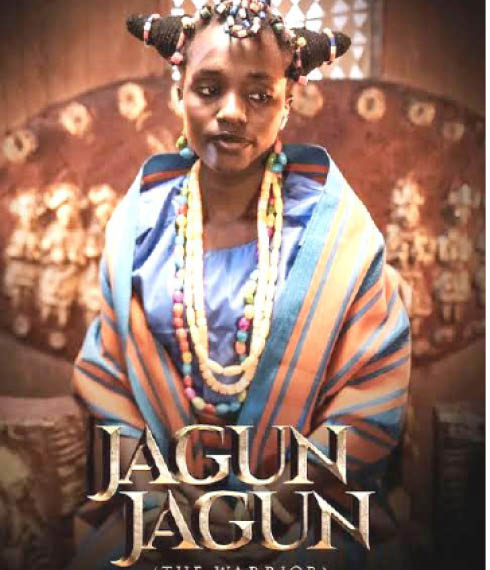Title: Jagun Jagun
Year: 2023
Director: Adebayo Tijani, Tope Adebayo
Running time: 2h 13m
Days before the Nigerian Adebayo Tijani and Tope Adebayo-directed Jagun Jagun began streaming on Netflix, the lyrics to a Yoruba song kept recurring in my mind, “jagun jagun n bọ,” (the warrior is coming), the words echoed. I couldn’t recall anything beyond these words. Thus, for an inconceivable reason, a fragment of this war song was on a loop. After numerous attempts at recollecting the complete song, I resign in defeat. I had learned this war-professing song from watching enough Nollywood Yoruba films whose titles have now fizzled out of my memory. The song heralds the coming of a warrior, and for the Femi Adebayo-led Yoruba epic, Jagun Jagun, – which features a prominent warrior – it made sense why the song kept recurring. Jagun Jagun’s trailer had done an effective job of building anticipation.
A few seconds into the film and I am smiling in admiration. The film opens with an expansive and beauteous aerial shot. From that opening scene, the film casually informs the audience of the beautiful pictures in store for viewers. The drone shots, accompanied by musical scores draped in Yoruba cosmology, lure the audience to the beautifully-captured world of Jagun Jagun. In what appears to be the first character-defining scenes in Jagun Jagun, Jigan (Odunlade Adekola) holds King Oniketo (Muyiwa Ademola) captive in the latter’s palace. After Jigan has committed enough sacrilegious acts, Ogundiji (Femi Adebayo) — the film’s self-defined villain, and saviour of intimidated kings – appears. With ease, Ogundiji subdues Jigan. After this scene trails off, the film sweeps into a series of unrelated and seemingly aimless rambling.
These labyrinthine scenes, supported by ear-pleasing musical scores, subtly introduce the film’s other characters: Gbotija (Lateef Adedimeji), Alarinka (Dele Odule), Gbogunmi (Ibrahim Yekini Itele), Ditemola (Kunle Afod), Moyale (Debo “Mr Macaroni” Adebayo), Kitan/Agemo (Bukunmi Oluwashina), and Erinfunto (Fathia Balogun). Ogundiji’s presence looms over these characters as they share distinct relationships with him. To Gbotija – who has come to learn the rhythms of war – Ogundiji is a distant but familiar role model. Alarinka’s politically-aligned relationship with Ogundiji provides an interesting but marginally developed subplot to the film. Being an undemocratic ruler, Alarinka with a horde of other kings, relies on Ogunjimi’s military might to quell opposition. To Ogundiji’s kin – wife and daughter – he is a brute. For the soldiers (led by Ditemola and Moyale) in Ogundiji’s school of war, Ogundiji is an imperious god with fierce demands.
Propelled forward by the Adebayo Tijani-written script, the once confusing scene sequences gain monumental coherence. Gbotija develops a romantic relationship with Kitan, Ogundiji’s daughter. The endless visits to different villages in Jagun Jagun inform the audience of Ogundiji’s omniscient and autocratic nature. Through the villagers’ conversations, we infer how far-reaching Ogunjimi’s presence is. As Ogundiji’s power and influence grow unabated, Gbotija begins to command attention. Here in lies the conflict. As a power-obsessed brute, Ogundiji jealously guards his glory. To dampen Gbotija’s growing popularity into oblivion, Ogundiji assigns him three tasks to perform.
Nollywood movies that spotlight historic moments in Nigeria
National service between law and morality
The technical aspects of Jagun Jagun call for attention and the visual elements of the film command attention. The cinematographer (Adeoluwa Owu) often dangles the beautiful landscapes of the film to full glare. The cinematography aside, the lexical tapestry is also commendable. In dialogues heavily embedded in puns and onomatopoeia, the film endears viewers to the cultural landscape of Jagun Jagun. The verbal exchanges between characters are delivered in Yoruba dialogues, coiled within the cosmological beliefs of the Yoruba people. Nollywood, once again, reiterates its control of sound design in the film’s production. Scored by Tolu Obanro, who worked on the musical scores for Gangs of Lagos (2023), the compositions guide the audience’s emotional response to the film. The war-throbbing, nature-attuned, and emotional musical scores emotively carry the subtle messages of the film. Sartorial commendation is deserving for the costume and props design for being able to distinguish characters into different social classes through their attires. There is precisionist attention to technical detail in Jagun Jagun. Sadly, that pedantic attention is bereft in the writing of Jagun Jagun. Thus, despite how visually appealing the technical aspect of the film is, at different intervals, the film’s writing detours into being incoherent.
There is a steady rise of Yoruba epics in contemporary Nollywood production. There is the Kunle Afolayan-directed Anikulapo (2022), the Adebayo Tijani and Tope Adebayo-directed King of Thieves (2022), and recently, the 2023 Odunlade Adekola-directed Orisha. These Yoruba epics are unified by their maker’s efforts at being connoisseurs of Yoruba heritage. Their box office returns and the ability of these films to gain ascendancy on Netflix and Prime Video shows that Nigerians are open to watching indigenous films. Nollywood has witnessed the presence of Yoruba epics with a knack for embracing the cultures of the Yoruba people. The rising popularity of Yoruba epics has also brought about a desire for epics from other ethnic groups in Nigeria.
In Nigeria, where it is almost impossible to be politically apathetic, Nigerian filmmakers occasionally riddle their films with social commentary. Though Jagun Jagun fails to lucidly express its loitering political undertone, it is filled with commendable political remarks. The closing scene of Jagun Jagun has a monologue that is now strapped to my consciousness. Gbotija fleetingly comments on how position-thirsty rulers employ the youths to create turmoil for the rulers’ benefit. Another laid-back attempt of Jagun Jagun in its subtle political education is its cursory commentary about undemocratic rulers. The political history of Nigeria, like the political landscape of Jagun Jagun, is littered with rulers whose ascent to political offices is obtained through bribery and other unlawful activities. Although the film does not develop these subplots, they subliminally act as conflicts that propel the plot.
Fortunately for Jagun Jagun, the script has enough worthwhile materials to secure the film’s longevity in viewers’ minds. Unfortunately, these materials are either unexplored or hazily exploited. The lip-service engagement of the unconventional relationship between Gbotija and Kitan is too glaring to notice. Viewers are also left to speculate on Ogundiji’s history. Seconds after watching Jagun Jagun, to summarise my opinion about the film, I wrote these words: Jagun Jagun is a watchable and impressive film but it is very forgettable. These words carry the urgency of my earliest conviction about Jagun Jagun and by extension, other Nollywood Yoruba epics. These films will attract attention for days, weeks and maybe months after they appear in cinemas or streaming platforms, but after all the charade dies down, they will ease off audiences’ consciousness.
Source: www.afrocritik.com

 Join Daily Trust WhatsApp Community For Quick Access To News and Happenings Around You.
Join Daily Trust WhatsApp Community For Quick Access To News and Happenings Around You.


